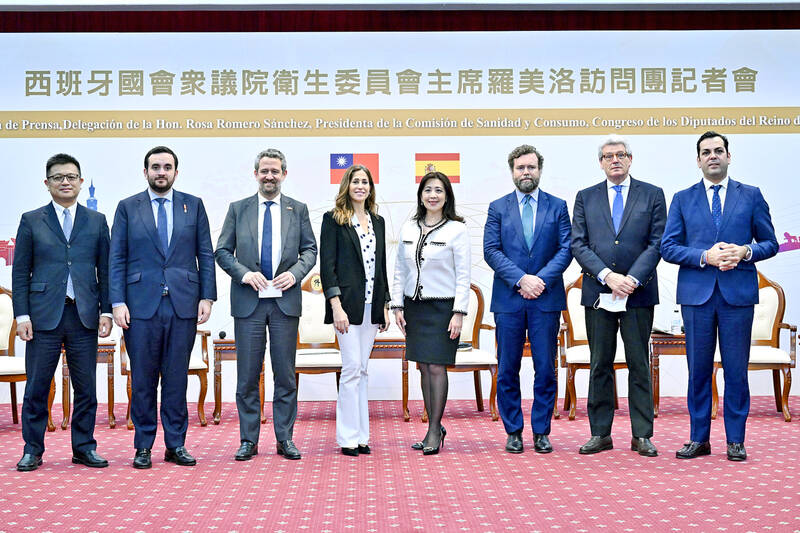Lithuania is expecting more cooperation with Taiwan on defense, security and the economy after fruitful discussions during a visit to the nation, a visiting Lithuanian delegation told a news conference yesterday.
The nine-member parliamentary delegation from the National Security and Defense Committee arrived in Taiwan on Monday for a six-day visit.
Sending a cross-party delegation to Taiwan shows “quite a strong consensus in Lithuania on our relations with Taiwan,” committee head Laurynas Kasciunas told reporters at the Ministry of Foreign Affairs in Taipei.

Photo: Fang Pin-chao, Taipei Times
On her second visit to Taiwan, Dovile Sakaliene, vice chair of the Lithuanian Parliamentary Group for Relations with Taiwan, said that ties between Lithuania and Taiwan are “developing quite quickly and in the right direction.”
Former Lithuanian minister of foreign affairs Audronius Azubalis said that compared with his first visit to Taiwan 25 years ago, “I see tremendous progress in your country.”
The sustainability of relations between the two nations is important in the fields of defense and security, Lithuanian lawmaker Eugenijus Sabutis said.

Photo: Tu Chien-jung, Taipei Times
Lithuania and Taiwan are facing the same problems posed by aggressive neighbors, so have many common issues to share, Lithuanian lawmaker Edita Rudeliene said.
Despite the distance between the two nations, “we are bridged together by common values,” Lithuanian lawmaker Ieva Pakarklyte said.
The main purpose of the visit is to discuss topics related to defense and security, Kasciunas said.
Commenting on Taiwan’s plan to reinstate one year of mandatory military service next year, he said: “It is very, very wise.”
After exchanging ideas and plans with Taiwan, the two sides can foresee cooperation in many areas, including cybersecurity and combating disinformation and propaganda, Sakaliene said.
A group of Lithuanian companies would likely sign a major economic cooperation pact with Taiwanese companies next week, Pakarklyte said.
Speaking of the changes brought by Russia’s invasion of Ukraine, Sakaliene said that Lithuania, Taiwan and Ukraine are “icebreakers in changing the mentality that is old and outdated” to help the world realize that “by withdrawing, we only incite the aggressor to attack,”
“Taiwan’s help to Ukraine also helps Taiwan,” as it provides European nations with more motivation to help Taiwan, she added.
Separately yesterday, Spanish lawmaker Rosa Romero Sanchez said that Spain’s Congress of Deputies opposes any unilateral action to alter the “status quo” in the Taiwan Strait.
Romero Sanchez, president of the Spanish lower house’s Health and Consumer Commission, made the comment at a news conference, adding that China and Taiwan should engage in constructive dialogue.
She said that the Spanish lower house issued a statement on Oct. 6 last year to express its concerns over tensions in the Taiwan Strait.
The Ministry of Foreign Affairs said that it was the first time since the severing of diplomatic relations that a Spanish legislative branch had issued a statement in support of Taiwan.
Romero Sanchez said that she and her delegation are visiting Taiwan to explore opportunities to deepen bilateral ties.
Romero Sanchez arrived in Taiwan on Tuesday for a five-day visit with a delegation that also includes Spanish lawmakers Jaime de Olano, Ricardo Tarno Blanco, Jose Angel Alonso and Juan Diego Requena.
Unlike the German, Lithuanian and Tuvaluan parliamentary groups that have visited Taiwan over the past week, the Spanish delegation was not scheduled to meet with President Tsai Ing-wen (蔡英文) or Premier Su Tseng-chang (蘇貞昌).

Right-wing political scientist Laura Fernandez on Sunday won Costa Rica’s presidential election by a landslide, after promising to crack down on rising violence linked to the cocaine trade. Fernandez’s nearest rival, economist Alvaro Ramos, conceded defeat as results showed the ruling party far exceeding the threshold of 40 percent needed to avoid a runoff. With 94 percent of polling stations counted, the political heir of outgoing Costa Rican President Rodrigo Chaves had captured 48.3 percent of the vote compared with Ramos’ 33.4 percent, the Supreme Electoral Tribunal said. As soon as the first results were announced, members of Fernandez’s Sovereign People’s Party

MORE RESPONSIBILITY: Draftees would be expected to fight alongside professional soldiers, likely requiring the transformation of some training brigades into combat units The armed forces are to start incorporating new conscripts into combined arms brigades this year to enhance combat readiness, the Executive Yuan’s latest policy report said. The new policy would affect Taiwanese men entering the military for their compulsory service, which was extended to one year under reforms by then-president Tsai Ing-wen (蔡英文) in 2022. The conscripts would be trained to operate machine guns, uncrewed aerial vehicles, anti-tank guided missile launchers and Stinger air defense systems, the report said, adding that the basic training would be lengthened to eight weeks. After basic training, conscripts would be sorted into infantry battalions that would take

GROWING AMBITIONS: The scale and tempo of the operations show that the Strait has become the core theater for China to expand its security interests, the report said Chinese military aircraft incursions around Taiwan have surged nearly 15-fold over the past five years, according to a report released yesterday by the Democratic Progressive Party’s (DPP) Department of China Affairs. Sorties in the Taiwan Strait were previously irregular, totaling 380 in 2020, but have since evolved into routine operations, the report showed. “This demonstrates that the Taiwan Strait has become both the starting point and testing ground for Beijing’s expansionist ambitions,” it said. Driven by military expansionism, China is systematically pursuing actions aimed at altering the regional “status quo,” the department said, adding that Taiwan represents the most critical link in China’s

EMERGING FIELDS: The Chinese president said that the two countries would explore cooperation in green technology, the digital economy and artificial intelligence Chinese President Xi Jinping (習近平) yesterday called for an “equal and orderly multipolar world” in the face of “unilateral bullying,” in an apparent jab at the US. Xi was speaking during talks in Beijing with Uruguayan President Yamandu Orsi, the first South American leader to visit China since US special forces captured then-Venezuelan president Nicolas Maduro last month — an operation that Beijing condemned as a violation of sovereignty. Orsi follows a slew of leaders to have visited China seeking to boost ties with the world’s second-largest economy to hedge against US President Donald Trump’s increasingly unpredictable administration. “The international situation is fraught